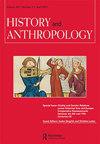接触追踪:接触的实质性
IF 0.4
2区 历史学
Q3 ANTHROPOLOGY
引用次数: 0
摘要
本文通过跨越时间、学科、研究领域和技术的重要性实践,介绍了“材料遭遇”的特刊。我们使用“轨迹”和“痕迹”的转喻,以及物体和事物的区别,来理清材料和对材料的理解如何调解与特定人群或地点的动态接触,尤其是在大洋洲。这些物质的相遇从各个方面产生了不同的、不稳定的认识形式,通过人的化身(在相遇中)和具体化的物化(在对象、铭文、再现、纪念中)的不均匀流动。我们并置假设,如果越来越多的挑战优先材料在面向对象的领域,如考古学和博物馆学;1990年前后物质文化研究的反思性复兴与人类学的“物质转向”以及历史学家迟来的对材料和材料重要性的认识,他们的工作依赖于他们试图阐明的过去的现有材料痕迹。关于人、地点、时间或事物的代理,我们强调物质的多元性及其相关的本体论,以及所有遭遇中固有的运动、不稳定和不完整的品质。本文章由计算机程序翻译,如有差异,请以英文原文为准。
Contact tracing: The materiality of encounters
ABSTRACT This article introduces the special issue on ‘Material Encounters’ by addressing the praxis of materiality across time, disciplines, areas of study, and technologies. We use the metonyms of track and trace and the distinction of objects and things to disentangle ways in which materials and understandings of the material mediate dynamic encounters with specific people or places, particularly in Oceania. These material encounters generate diverse, unstable forms of knowing on all sides, through the uneven flux of human embodiment (in encounters) and embodied materialization (in object, inscription, representation, memorialization). We juxtapose the assumed, if increasingly challenged priority of materials in object-oriented fields such as archaeology and museology; the reflective revival of material culture studies and the ‘material turn’ in anthropology from around 1990; and the belated recognition of the salience of materials and materialities by historians, whose craft depends on present material traces of the pasts they seek to elucidate. With reference to the agency of persons, places, time, or things, we stress the plurality of materialities and their related ontologies, and the qualities of movement, instability, and incompletion inherent in all encounters.
求助全文
通过发布文献求助,成功后即可免费获取论文全文。
去求助
来源期刊

History and Anthropology
Multiple-
CiteScore
1.80
自引率
0.00%
发文量
41
期刊介绍:
History and Anthropology continues to address the intersection of history and social sciences, focusing on the interchange between anthropologically-informed history, historically-informed anthropology and the history of ethnographic and anthropological representation. It is now widely perceived that the formerly dominant ahistorical perspectives within anthropology severely restricted interpretation and analysis. Much recent work has therefore been concerned with social change and colonial history and the traditional problems such as symbolism, have been rethought in historical terms. History and Anthropology publishes articles which develop these concerns, and is particularly interested in linking new substantive analyses with critical perspectives on anthropological discourse.
 求助内容:
求助内容: 应助结果提醒方式:
应助结果提醒方式:


